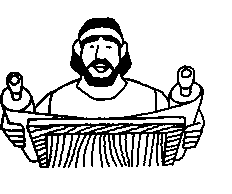
When Nebuchadnezzar captured the Jews of Jerusalem and forced them to march to Babylon to live in exile about 600 BC, the Samaritans, the people who lived in the region of Samaria in Palestine, remained safe in the hill country.
Though the Samaritans believed in the One God throughout this time, they made sacrifices to God on the mountain tops, because God had given them the mountains to keep them safe from captivity. The Samaritans also intermarried with the local people whose families worshiped false gods, though the Samaritans insisted that their new spouses worship the One God.
When the Judeans returned from Babylon, they were overwhelmed by sadness when they saw Jerusalem in ruins, and they tried to find the reason they had been forced into a long captivity so far from home.
After much study and debate, they decided they had been punished for not following God's laws closely enough, and they took all sorts of steps to purify their living.
The Judeans were most concerned about the purity of their bloodlines - that everyone in the community could trace his history to Jacob - and about the purity of their sacrifices, which they believed could be made only at the Temple in Jerusalem.
Because the Samaritans readily intermarried, and because they sacrificed to God in their own homeland, the Jews of Jerusalem decided that the Samaritans were not dedicated to the purity that God required and made the Samaritans outcasts. Judeans would not travel on Samaritan roads or drink from Samaritan wells; they thought they would become unclean in the eyes of God if they touched a Samaritan or shared a meal with him.
 So the
only two groups of people in the world who followed the laws God gave to
Moses and who all believed they were descended from
Abraham through Jacob
became bitter enemies.
So the
only two groups of people in the world who followed the laws God gave to
Moses and who all believed they were descended from
Abraham through Jacob
became bitter enemies. When Jesus tells the story of the Good Samaritan, he is talking to people who believe that not even one Samaritan could be a kind person.